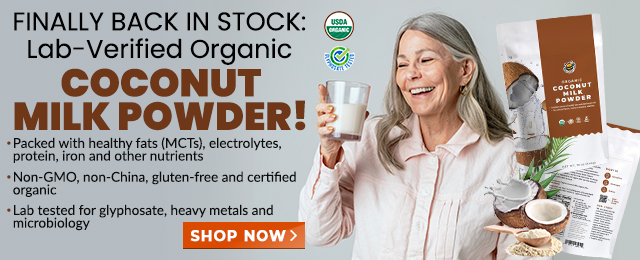
The Skincare of Nature: Papaya Reduces and Prevents Wrinkles
Tuesday, April 06, 2010 by: Melanie Grimes
Tags: papaya, skin wrinkles, health news
- European Court of Justice: Healthcare professionals who promoted or administered COVID-19 vaccines are CRIMINALLY LIABLE for any harm caused
- Oncologist warns of ‘terrifyingly aggressive’ cancers in children, linked to immune suppression from COVID vaccines
- Newly released JFK files reveal Pentagon's role in creating Lyme disease and covid in the same lab
- Ancient kitchen secrets REVEALED: How garlic, ginger and green onions fight cancer and heart disease
- Britain’s descent into police state censorship: Parents raided for questioning their daughter’s school system online
- NIH study, buried for decades, reveals that Flu Shots INCREASE elderly deaths, not prevent them
- COVID-19 scandal linked to CANCER SURGE: Billionaire researcher sounds alarm
- DARPA: The shadowy innovator behind the world’s most advanced military technologies
- Decentralize TV: Dr. Leonard Coldwell reveals shocking, heavily censored truths about CANCER, healing and the medical mafia complex
- “Old Man in a Chair”: The COVID-19 pandemic was a carefully orchestrated scheme for global control
- Musk targets “strangely wealthy” lawmakers in DOGE probe, names Pelosi, McConnell, Schumer
- RFK Jr. is reforming Americans’ health: A shift in power and paradigm
- Cinnamon plays a critical role in diabetes management
- FRAUD ALERT: Details DEMOCRATS do NOT want you to know about the $40 BILLION wasted on Fed-loaded credit cards cancelled by DOGE
- Utah governor allows ban on LGBT pride flags in public buildings and schools, will take effect without his signature
- Scientists unveil breakthrough method to eliminate "Forever Chemicals" from water, transforming waste into graphene
- RFK Jr. is pushing Big Pharma ad ban - and corporate media is panicking
- Pam Bondi promises ‘NO PLEA DEALS’ in Tesla vandalism cases - MAXIMUM PRISON TIME to be served for Dems and Libs’ freakshow violence against the Right
- Newly released JFK files reveal Pentagon's role in creating Lyme disease and covid in the same lab
- CDC finally halts $11 billion COVID funding scam as health officials admit the ‘pandemic’ was a fraud
- Analysis: The coming economic collapse, a mass uprising and Trump's three secret weapons to halt the growing revolt
- Kiss Your Genetic Privacy Good-Bye! 23andMe Gets Green Light to Sell Your Intimate Genetic Details to Anyone They Want
- Dr. Suzanne Humphries makes bombshell appearance on Joe Rogan podcast, exposing vaccine industry deception back to POLIOMYELITIS
- DEADLY DECEPTION: How COVID vaccines increased mortality rates and why authorities hid the truth
- Woman contracts WORLD'S DEADLIEST VIRUS after unknowingly being given the WRONG VACCINE
- Oncologist warns of ‘terrifyingly aggressive’ cancers in children, linked to immune suppression from COVID vaccines
- Here are TEN all-natural ways to protect your garden without using harmful chemicals
- Black cumin seed oil emerges as a powerful ally against breast cancer and chronic inflammation
- The hidden dangers in your kitchen: How cooking methods impact diabetes, cancer and aging
- Trump's greatest betrayal so far: Accelerating Middle East wars, silencing dissent, and serving Zionist masters
- Senate Democrats deny censorship industrial complex existed, defend government's role in silencing dissent
- Sugar-free deception: Artificial sweeteners hijack hunger signals, fuel obesity epidemic, study warns
- “Independent” anti-Russia outlet MEDUZA faces COLLAPSE as US funding dries up
- NIH study, buried for decades, reveals that Flu Shots INCREASE elderly deaths, not prevent them
- The Health Ranger releases “Vaccine Zombie” song and music video, using AI-animated zombies for the music video
- Discovery of vast underground city beneath Giza pyramids challenges human history
- Newly released JFK files reveal Pentagon's role in creating Lyme disease and covid in the same lab
- California's social media censorship law struck down: A victory for free speech or a threat to online safety?
- EPA advisor admits the agency is funneling billions to climate groups ahead of Trump’s return to White House
- The Health Ranger releases “Vaccine Zombie” song and music video, using AI-animated zombies for the music video
- Dr. Mike Yeadon releases 15-minute testimony - WATCH - about genocidal intent of COVID “vaccines”
- Florida takes a stand: DeSantis proposes permanent ban on mRNA vaccine mandates
- Mike Adams releases country western hit single: Goin’ Back in Time is Comin’ Home
- “Why we influenced the 2020 elections”: Facebook files reveal the coordinated effort to bury the Hunter Biden laptop story
- Unpacking the Lies That We’ve Been Fed – new song and music video released by Mike Adams, the Health Ranger
- House Intelligence Committee calls for the ARREST and PROSECUTION of Dr. Anthony Fauci
- The pandemic as a tool for INDOCTRINATION: Understanding “The Indoctrinated Brain” by Dr. Michael Nehls
- Rep. Nancy Mace introduces bill to ban biological males from female facilities on federal property
- Mike Adams releases music poetry sensation: A Child of God
- Sugarcane extract superior to cholesterol-lowering drugs?
- Survival 101: Effective EMF blocking techniques
- Michigan sheriff announces criminal investigation into 2020 election crimes, Dominion Voting Systems
- Peter Rost exposes Big Pharma corruption in his book “The Whistleblower: Confessions of a Healthcare Hitman”
- Migrants are taking advantage of recent hurricanes to scam residents and loot their homes
- Red Cross issues warning to stop blood plasma donations from vaccinated people
- Scientists confirm: GENIUS brain function can be spontaneously unleashed in humans without any apparent cause
- EPA advisor admits the agency is funneling billions to climate groups ahead of Trump’s return to White House
- HYSSOP: What research reveals about the health benefits of this ancient holy herb
- Two containers with completed ballots fall out of truck in Florida
- Fully vaccinated about to see “tsunami” of illness and death, warns virologist
- Global leaders unite to clamp down on “misinformation” with UN-backed Cascais Declaration
- BREAKING: 2025 NDAA authorizes mandatory military draft of WOMEN across America… as Pentagon pursues global NUCLEAR war with both Russia and China at the same time
- Michael Yon warns of a ZIONIST TAKEOVER in Trump’s second administration
- BOMBSHELL: DNA testing kits are a SCAM to develop ethnic-specific bioweapons
- Ozempic and Wegovy weight loss drugs are injectable LIZARD VENOM PEPTIDES that may unleash a devastating wave of organ failure… side effects align with symptoms of SNAKE BITES
- Israeli soldiers accused of even more torture and abuse in the West Bank
- These 13 countries just signed an agreement to engineer a global FAMINE by destroying food supply
- NASA admits that climate change occurs because of changes in Earth’s solar orbit, and NOT because of SUVs and fossil fuels
- RFK Jr. clears key hurdle: Sen. Susan Collins backs controversial HHS nominee, signaling a new era for health policy
- Sermon 30: How Jesus reveals Caesar’s FAKE CURRENCY and FALSE AUTHORITY
- Coriander seeds: Ancient medicine backed by modern science
- Arizona officials claim Maricopa County needs 10-13 days to tabulate results of the election
History of Papayas
Papayas originated in Central America and were carried and planted in other tropical zones by the early explorers. Christopher Columbus called them "the fruit of the angels".
Tissue Make-up of the Skin
The skin is made up of connective tissues. There are three types of connective tissues in the skin: structural proteins, specialized proteins, and poteoglycans. The structural proteins are the ones responsible for elasticity: collagen and elastin.
Papain in Papayas Restores Skin
Papain helps digest protein foods (and is used in both dietary supplements and chewing gum). The enzyme, papain, is found in all papayas, but especially when they are not yet ripe. Research in Japan demonstrated that a papaya preparation had antioxidant activity and healed mucus membranes. The research indicated that papaincan improves wound healing and is therefore beneficial to the skin.
Vitamin C in Papayas Prevents Wrinkles
Papayas also contain vitamin C, which is known to help restore skin elasticity. Vitamin C helps the manufacture of collagen, which then firms the skin.
Papaya Facial Mask
To make a papaya facial mask, select a green papaya, one that is not yet fully ripe. Mash one half of the papaya and combine with a tablespoon of honey. Cleanse the face with warm water and apply the papaya mask. Leave on for a half hour and then rinse off. This can be repeated twice a week to help rebuild skin and prevent wrinkles.
Latex-fruit Allergy
Papayas contain an ingredient called chitinases. Chitinases can cause an allergic reaction in people who have a latex allergy. This type of allergy is called a latex-fruit allergy. People with allergies to latex might be allergic to papayas, so care should be taken. If you suspect an allergy and want to use a papaya facemask, apply the mask to a small area of the face and wait 24 hours. If there is no redness or swelling, it is safe to continue to use the papaya facemask.
https://www.naturalnews.com/026067_health_ski...
http://www.whfoods.com/genpage.php?tname=foo...
http://www.susanstars.com/howto/weekend_spa....
http://www.ncbi.nlm.nih.gov/pubmed/16636366?...
http://www.ncbi.nlm.nih.gov/bookshelf/br.fcg...
About the author
Melanie Grimes is a writer, award-winning screenwriter, medical journal editor, and adjunct faculty member at Bastyr University. She also teaches homeopathy at the Seattle School of Homeopathy and the American Homeopathic Medical College.A trained homeopath, she is the editor of the homeopathic journal, Simillimum, and has edited alternative and integrative medical journals for 15 years. She has taught creative writing, founded the first Birkenstock store in the USA and authored medical textbooks.
Her ebook on Natural Remedies for the Flu is available at:
http://melanie-grimes.blogspot.com/2009/04/b...
Follow her blog at
http://melanie-grimes.blogspot.com/
www.melaniegrimes.com
Papaya at FETCH.news
Get independent news alerts on natural cures, food lab tests, cannabis medicine, science, robotics, drones, privacy and more.
Take Action: Support Natural News by linking to this article from your website
Permalink to this article:
Embed article link: (copy HTML code below):
Reprinting this article:
Non-commercial use OK, cite NaturalNews.com with clickable link.
Follow Natural News on Facebook, Twitter, Google Plus, and Pinterest
Science News & Studies
Medicine News and Information
Food News & Studies
Health News & Studies
Herbs News & Information
Pollution News & Studies
Cancer News & Studies
Climate News & Studies
Survival News & Information
Gear News & Information
News covering technology, stocks, hackers, and more



"Big Tech and mainstream media are constantly trying to silence the independent voices that dare to bring you the truth about toxic food ingredients, dangerous medications and the failed, fraudulent science of the profit-driven medical establishment.
Email is one of the best ways to make sure you stay informed, without the censorship of the tech giants (Google, Apple, Facebook, Twitter, YouTube, etc.). Stay informed and you'll even likely learn information that may help save your own life."
–The Health Ranger, Mike Adams












































